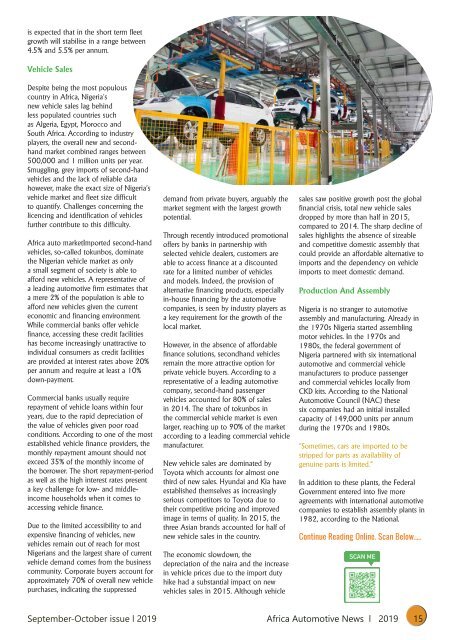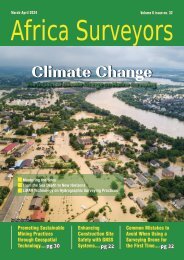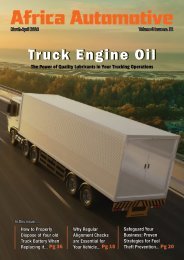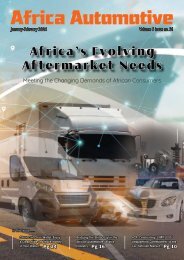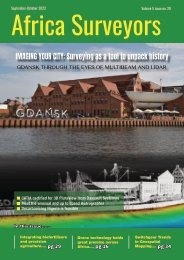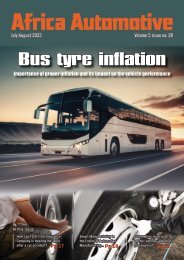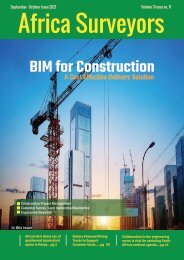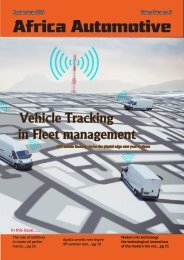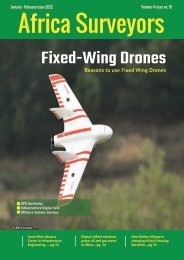Africa Automotive News September-October digital issue 2019
Africa Automotive prides itself to be the ONLY Africa’s leading and MOST authoritative magazine for the automotive industry in Africa with printed copies for the automotive industry decision makers in both government, NGO’s and private sector. The Bi-monthly magazine offers cost effective advertising services that get results and improves growth in the auto B2C and B2B sector, keeping an eye on latest technologies in Africa and across the world, the magazine predominately covers the developments in the Africa auto industry.
Africa Automotive prides itself to be the ONLY Africa’s leading and MOST authoritative magazine for the automotive industry in Africa with printed copies for the automotive industry decision makers in both government, NGO’s and private sector. The Bi-monthly magazine offers cost effective advertising services that get results and improves growth in the auto B2C and B2B sector, keeping an eye on latest technologies in Africa and across the world, the magazine predominately covers the developments in the Africa auto industry.
You also want an ePaper? Increase the reach of your titles
YUMPU automatically turns print PDFs into web optimized ePapers that Google loves.
is expected that in the short term fleet<br />
growth will stabilise in a range between<br />
4.5% and 5.5% per annum.<br />
Vehicle Sales<br />
Despite being the most populous<br />
country in <strong>Africa</strong>, Nigeria’s<br />
new vehicle sales lag behind<br />
less populated countries such<br />
as Algeria, Egypt, Morocco and<br />
South <strong>Africa</strong>. According to industry<br />
players, the overall new and secondhand<br />
market combined ranges between<br />
500,000 and 1 million units per year.<br />
Smuggling, grey imports of second-hand<br />
vehicles and the lack of reliable data<br />
however, make the exact size of Nigeria’s<br />
vehicle market and fleet size difficult<br />
to quantify. Challenges concerning the<br />
licencing and identification of vehicles<br />
further contribute to this difficulty.<br />
<strong>Africa</strong> auto marketImported second-hand<br />
vehicles, so-called tokunbos, dominate<br />
the Nigerian vehicle market as only<br />
a small segment of society is able to<br />
afford new vehicles. A representative of<br />
a leading automotive firm estimates that<br />
a mere 2% of the population is able to<br />
afford new vehicles given the current<br />
economic and financing environment.<br />
While commercial banks offer vehicle<br />
finance, accessing these credit facilities<br />
has become increasingly unattractive to<br />
individual consumers as credit facilities<br />
are provided at interest rates above 20%<br />
per annum and require at least a 10%<br />
down-payment.<br />
Commercial banks usually require<br />
repayment of vehicle loans within four<br />
years, due to the rapid depreciation of<br />
the value of vehicles given poor road<br />
conditions. According to one of the most<br />
established vehicle finance providers, the<br />
monthly repayment amount should not<br />
exceed 35% of the monthly income of<br />
the borrower. The short repayment-period<br />
as well as the high interest rates present<br />
a key challenge for low- and middleincome<br />
households when it comes to<br />
accessing vehicle finance.<br />
Due to the limited accessibility to and<br />
expensive financing of vehicles, new<br />
vehicles remain out of reach for most<br />
Nigerians and the largest share of current<br />
vehicle demand comes from the business<br />
community. Corporate buyers account for<br />
approximately 70% of overall new vehicle<br />
purchases, indicating the suppressed<br />
demand from private buyers, arguably the<br />
market segment with the largest growth<br />
potential.<br />
Through recently introduced promotional<br />
offers by banks in partnership with<br />
selected vehicle dealers, customers are<br />
able to access finance at a discounted<br />
rate for a limited number of vehicles<br />
and models. Indeed, the provision of<br />
alternative financing products, especially<br />
in-house financing by the automotive<br />
companies, is seen by industry players as<br />
a key requirement for the growth of the<br />
local market.<br />
However, in the absence of affordable<br />
finance solutions, secondhand vehicles<br />
remain the more attractive option for<br />
private vehicle buyers. According to a<br />
representative of a leading automotive<br />
company, second-hand passenger<br />
vehicles accounted for 80% of sales<br />
in 2014. The share of tokunbos in<br />
the commercial vehicle market is even<br />
larger, reaching up to 90% of the market<br />
according to a leading commercial vehicle<br />
manufacturer.<br />
New vehicle sales are dominated by<br />
Toyota which accounts for almost one<br />
third of new sales. Hyundai and Kia have<br />
established themselves as increasingly<br />
serious competitors to Toyota due to<br />
their competitive pricing and improved<br />
image in terms of quality. In 2015, the<br />
three Asian brands accounted for half of<br />
new vehicle sales in the country.<br />
The economic slowdown, the<br />
depreciation of the naira and the increase<br />
in vehicle prices due to the import duty<br />
hike had a substantial impact on new<br />
vehicles sales in 2015. Although vehicle<br />
sales saw positive growth post the global<br />
financial crisis, total new vehicle sales<br />
dropped by more than half in 2015,<br />
compared to 2014. The sharp decline of<br />
sales highlights the absence of sizeable<br />
and competitive domestic assembly that<br />
could provide an affordable alternative to<br />
imports and the dependency on vehicle<br />
imports to meet domestic demand.<br />
Production And Assembly<br />
Nigeria is no stranger to automotive<br />
assembly and manufacturing. Already in<br />
the 1970s Nigeria started assembling<br />
motor vehicles. In the 1970s and<br />
1980s, the federal government of<br />
Nigeria partnered with six international<br />
automotive and commercial vehicle<br />
manufacturers to produce passenger<br />
and commercial vehicles locally from<br />
CKD kits. According to the National<br />
<strong>Automotive</strong> Council (NAC) these<br />
six companies had an initial installed<br />
capacity of 149,000 units per annum<br />
during the 1970s and 1980s.<br />
“Sometimes, cars are imported to be<br />
stripped for parts as availability of<br />
genuine parts is limited.”<br />
In addition to these plants, the Federal<br />
Government entered into five more<br />
agreements with international automotive<br />
companies to establish assembly plants in<br />
1982, according to the National.<br />
Continue Reading Online. Scan Below.....<br />
<strong>September</strong>-<strong>October</strong> <strong>issue</strong> l <strong>2019</strong><br />
<strong>Africa</strong> <strong>Automotive</strong> <strong>News</strong> l <strong>2019</strong> 15


